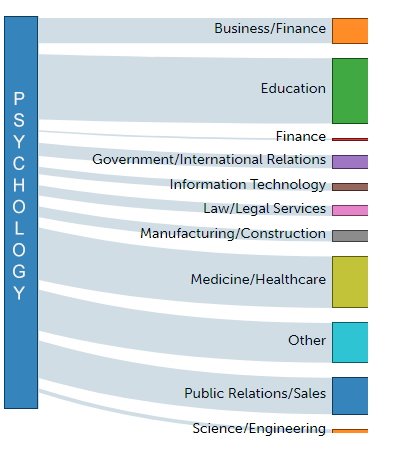Students often combine psychology with other majors or minors such as biology, economics, mathematics, sociology, or political science. As a result, our majors go into a wide variety of fields. Many, either immediately after graduation or within a few years, enter some type of graduate program. Some of these students enroll in professional schools for medicine, dentistry, law, education, or nursing; other students enroll in business-related graduate programs for master´s degrees in business or health care administration. Many of our majors seek advanced degrees in clinical or counseling psychology or related fields such as social work and speech pathology. Several majors each year enter graduate programs leading to the doctorate in various areas of academic psychology.
After Union
What can you do with a psychology degree?
Many of our majors go on in psychology or related fields; the others go into a variety of occupations and graduate programs, including business, medicine, and law. Some graduates eventually acquire a doctoral degree in psychology. According to statistics derived from the National Center for Educational Statistics database, Union College ranked 15thamong its 32 highly competitive peer institutions for number of Ph.D.’s produced during the last decade (ending in 2001).
In addition, a fairly large number of students pursue masters-level degrees in psychology and related areas such as speech pathology, social work, and education. Of the 202 students graduating from 1998-2004 for whom we have records, 60% went on to earn a masters degree or higher. Of those not going on to graduate school, 36% went straight into psychology- related employment, most in human services, health fields, or research, 34% entered a business-oriented profession (e.g., sales, management, banking), 15% worked in an educational setting (e.g., pre-school or private school teacher, college admissions counselor), and 6% became event planners or program coordinators.
As written in the opening paragraph of the Psychology Department’s Mission Statement, “the fundamental educational goal of the Psychology Department is to help students develop the intellectual skills which are at the center of all liberal education: a) the capacity to think deeply, critically, logically, complexly, and ethically, b) the ability to evaluate claims to truth and to make educated, defensible judgments under conditions of uncertainty and complexity, c) the capacity to use information resources and to learn new information independently, and d) the ability to express one’s thoughts in writing and speech.” These are core skills that will stay with you throughout your life, and that are valued by employers, regardless of the setting. If you’ve ever wondered why the Psychology major requires specific courses (e.g., statistics and core-area courses) and specific types of courses (e.g., seminars and labs), one reason is to ensure that all of our majors graduate with this core set of intellectual abilities.

